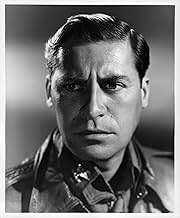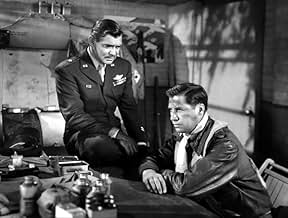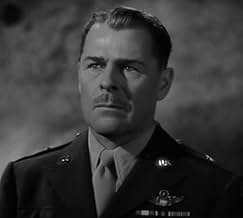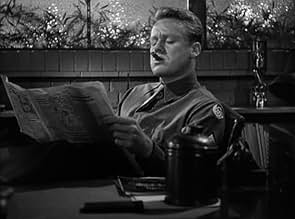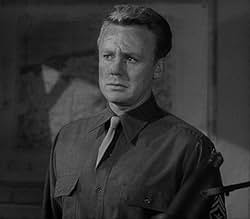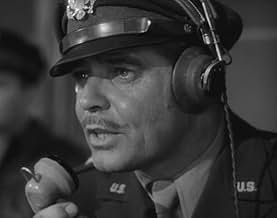IMDb रेटिंग
7.3/10
2.2 हज़ार
आपकी रेटिंग
अपनी भाषा में प्लॉट जोड़ेंArmy generals struggle with the decision to prioritize bombing the German factories producing new jet fighters over the extremely high casualties the mission will cost.Army generals struggle with the decision to prioritize bombing the German factories producing new jet fighters over the extremely high casualties the mission will cost.Army generals struggle with the decision to prioritize bombing the German factories producing new jet fighters over the extremely high casualties the mission will cost.
- निर्देशक
- लेखक
- स्टार
- पुरस्कार
- 3 जीत और कुल 2 नामांकन
फ़ीचर्ड समीक्षाएं
"Command Decision" is based on a stage play, so scenes of aerial combat are not to be found in the movie. This is a major difference between it and "Twelve O'clock High," released a year later in 1949, and which presented a more engaging, gritty, realistic motion picture of aerial combat and the toll it takes on the airmen and their support teams and commanders on the ground.
"Command Decision" tells a story of WWII air warfare from the point of view generals, politicians and the press, and the process of making a military decision in light of political consequences and public opinion. Clark Gable gives a great performance as General Casey, the officer who acts out of military necessity in choosing his targets, and in doing so, knows he puts the lives of his men and his friends on the line. Walter Pidgeon is General Kane, Gable's superior, who has lost some of his ability to look at his duty in purely military terms. Instead he perceives his mission is to fight the politicos and the press and to get the best spin on the actions of his command and commanders. Brian Donleavy is General Garnet, a relative newcomer to all of this. He is eager for his first command, but once on the scene at a combat headquarters, he begins to have doubts of his own about the mission, the politics and his own ability to send young men to their deaths.
The command decision in this fine, taut film is not one climatic decision, but is the story of a number of command decisions made by the three general officers, and how each effects and feeds off of the other men's command decisions throughout the film.
Good performances by all, a little melodramatic at times, but overall, one of the best war movies (especially about air warfare) you'll come across.
"Command Decision" tells a story of WWII air warfare from the point of view generals, politicians and the press, and the process of making a military decision in light of political consequences and public opinion. Clark Gable gives a great performance as General Casey, the officer who acts out of military necessity in choosing his targets, and in doing so, knows he puts the lives of his men and his friends on the line. Walter Pidgeon is General Kane, Gable's superior, who has lost some of his ability to look at his duty in purely military terms. Instead he perceives his mission is to fight the politicos and the press and to get the best spin on the actions of his command and commanders. Brian Donleavy is General Garnet, a relative newcomer to all of this. He is eager for his first command, but once on the scene at a combat headquarters, he begins to have doubts of his own about the mission, the politics and his own ability to send young men to their deaths.
The command decision in this fine, taut film is not one climatic decision, but is the story of a number of command decisions made by the three general officers, and how each effects and feeds off of the other men's command decisions throughout the film.
Good performances by all, a little melodramatic at times, but overall, one of the best war movies (especially about air warfare) you'll come across.
This is an under-appreciated gem of a move.
To start with, the core story sounds utterly fantastic, but it is partly true. There was never a "Lance-Wulf 190", but there really was a Messerschmidt Me-262 in World War 2. The Me-262 wasn't quite the wonder-plane which the mythical Lance-Wulf was, but it was a swept-wing jet with a top speed of 540 mph, a blinding speed for the time. And, as fighter pilots say, "speed is life".
American bombing in August, 1943 did delay the introduction of the real Me-262. (The pre-production aircraft were wrecked on an assembly line, forcing a delay of several months.) The irony is that the German jet fighter program was really stymied by Hitler's aversion to defensive weapons and the German feeling that the war could be won with existing fighter types.
There is, however, a "message" in this film which fully applies to civilian life. You know that everything is okay just now, but this will soon come to an end. Given those facts, are you willing to take some massive losses now and solve the problem? Or do you just wait for the situation to become visible to everyone before you act?
I don't know how many times I've seen people--even bright ones--opt for the "wait and see" course of action. It never works.
Just as Betty Davis's 1938 film "Jezebel" was overshadowed by "Gone With The Wind", this film was overshadowed by "Twelve O'Clock High".
To start with, the core story sounds utterly fantastic, but it is partly true. There was never a "Lance-Wulf 190", but there really was a Messerschmidt Me-262 in World War 2. The Me-262 wasn't quite the wonder-plane which the mythical Lance-Wulf was, but it was a swept-wing jet with a top speed of 540 mph, a blinding speed for the time. And, as fighter pilots say, "speed is life".
American bombing in August, 1943 did delay the introduction of the real Me-262. (The pre-production aircraft were wrecked on an assembly line, forcing a delay of several months.) The irony is that the German jet fighter program was really stymied by Hitler's aversion to defensive weapons and the German feeling that the war could be won with existing fighter types.
There is, however, a "message" in this film which fully applies to civilian life. You know that everything is okay just now, but this will soon come to an end. Given those facts, are you willing to take some massive losses now and solve the problem? Or do you just wait for the situation to become visible to everyone before you act?
I don't know how many times I've seen people--even bright ones--opt for the "wait and see" course of action. It never works.
Just as Betty Davis's 1938 film "Jezebel" was overshadowed by "Gone With The Wind", this film was overshadowed by "Twelve O'Clock High".
I found an old tape of Command Decision which I must have made 20 years ago. I concur with all those who have said that it is one of the best WW2 films ever made, but what struck me most forcefully was the fact that this highly intelligent, gripping and thoughtful film was made with a large crew of established filmstars by a completely commercial film studio. It brought home to me forcibly what was lost when the old studio system broke up and the sheer craftsmanship which it embodied was dispersed. The sheer childishness of most current films becomes even more evident.
Writing as one who lived through the bombing of Britain, the historical perspective on the Allied wartime bombing campaign was fascinating. One small complaint--all film coverage of the American campaign in WW2 seems to focus on the Flying Fortress. Actually, most of the bombs were dropped by the Consolidated Liberator squadrons--less photogenic but more effective!
Writing as one who lived through the bombing of Britain, the historical perspective on the Allied wartime bombing campaign was fascinating. One small complaint--all film coverage of the American campaign in WW2 seems to focus on the Flying Fortress. Actually, most of the bombs were dropped by the Consolidated Liberator squadrons--less photogenic but more effective!
Just saw this on TCM. The story of generals fighting generals, press officers, politicians, etc. There's a few cliches, like the pilot who get news his wife has had a son gets killed during a mission. Don't expect Gable to give an over-the-top performance. It was originally a stage play -- so there are lots of one-on-one confrontations -- they are all done well.
There are no special effects, no women, no air battles. There's spliced in newsreel footage of a plane that lands and explodes. 1948 audiences couldn't really appreciate the abstraction of "air supremacy" that is the heart of the fight here. In our post-Gulf War post-Afghan War -- we now can appreciate the vision of men who took these risks -- so I'd say there's a special historical importance to this film. Check around the web for info on Gable's WW II service record -- he enlisted at age 41 into the Army Air Corps.
There are no special effects, no women, no air battles. There's spliced in newsreel footage of a plane that lands and explodes. 1948 audiences couldn't really appreciate the abstraction of "air supremacy" that is the heart of the fight here. In our post-Gulf War post-Afghan War -- we now can appreciate the vision of men who took these risks -- so I'd say there's a special historical importance to this film. Check around the web for info on Gable's WW II service record -- he enlisted at age 41 into the Army Air Corps.
There must be at least one whole generation of viewers who don't even know this film exists! Yet it remains one of the very best WWII films ever made. I first saw as a child, when it was quite new, and have seen it several times since. It has never lost its hold and that, I suppose, principally because of Clark Gable's superb performance (although the other parts are all very strongly done). It really must be one of his finest screen roles and that alone, one might think, would ensure that it is never long absent from television screens. Sadly it has been shown in Britain but once that I know of, and is not available here on a PAL-system video, although "Twelve O'Clock High" is available and often screened. In many ways the two films complement each other, each not wholly to be appreciated without seeing the other. "Twelve O'Clock High" has an almost exclusively military focus while "Command Decision" brings in the effect of political factors on military decisions. The latter film, however, has an edge: Gable on top form and that was always something very special.
क्या आपको पता है
- ट्रिवियाClark Gable enlisted in the US Army Air Forces after his wife Carole Lombard died in a plane crash on a war bonds selling trip assisting the war effort. Gable went to Officers Candidate School (OCS), graduating as a second lieutenant, and was eventually promoted to major. He was trained as an aerial gunner and combat cameraman and was awarded both the Distinguished Flying Cross and Air Medal for at least five aerial bombing missions over Germany from England with the 351st Bomb Group (Heavy). Adolf Hitler personally offered a reward to the pilot or anti-aircraft gun crew who shot down Gable's plane.
- गूफ़When General Dennis tries to talk down the bombardier flying the crippled bomber, the bombardier reports that the aircraft's fuel is exhausted. Presumably he had also dropped his bomb load over the target. His on-board supply of machine gun ammunition should be very low if not exhausted. Yet when the bomber crashes, it explodes and burns. If he has no bombs, no gas , and no machine gun ammunition, what's to burn?
- भाव
James Carwood: What's the answer, Brockie, all guts and no brain?
Elmer Brockhurst: No. That's putting it too simply. Dennis is one of those boys whose brain is fascinated by guts. He loves this lousy war.
- इसके अलावा अन्य वर्जनAlso available in a computer colorized version.
- कनेक्शनFeatured in Clark Gable: Tall, Dark and Handsome (1996)
टॉप पसंद
रेटिंग देने के लिए साइन-इन करें और वैयक्तिकृत सुझावों के लिए वॉचलिस्ट करें
- How long is Command Decision?Alexa द्वारा संचालित
विवरण
बॉक्स ऑफ़िस
- बजट
- $24,67,000(अनुमानित)
- चलने की अवधि1 घंटा 52 मिनट
- रंग
- पक्ष अनुपात
- 1.37 : 1
इस पेज में योगदान दें
किसी बदलाव का सुझाव दें या अनुपलब्ध कॉन्टेंट जोड़ें



